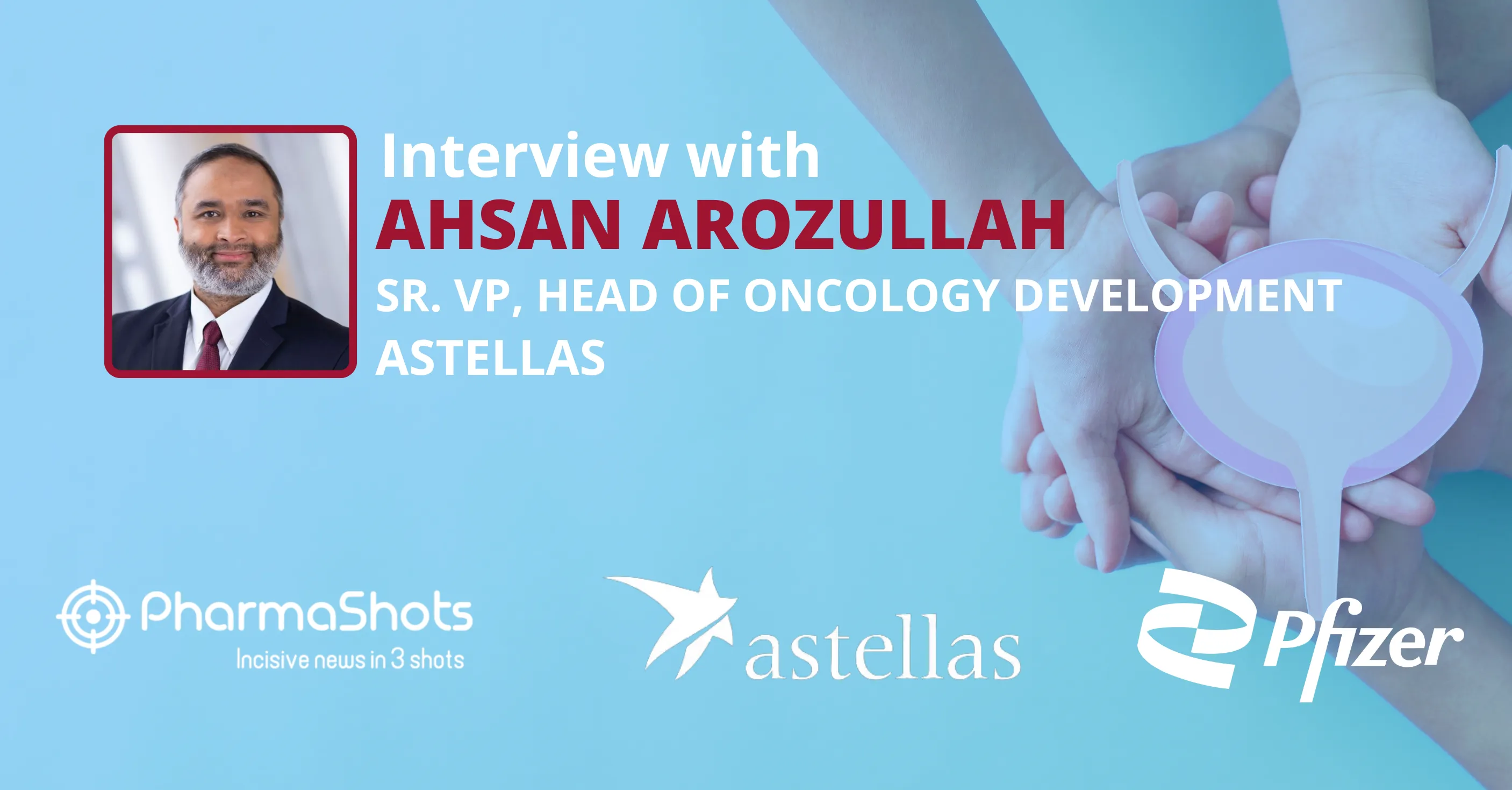
Andrea Mugan, Global Franchise Head of DDR & GYN/GU Cancers, AstraZeneca Shares Insights on ‘Never Miss’ campaign
Shots:
- Andrea briefed PharmaShots about the global prostate cancer awareness ‘Never Miss’ campaign developed by AstraZeneca and MSD to help men understand their potential risk of developing prostate cancer
- He also talked about the increasing number of prostate cancer patients and how this campaign will help support those who may be impacted by prostate cancer
- The interview shows AstraZeneca and MSD’s innovative approach to break down social barriers, empowering men to take control of their health
Smriti: Thank you for connecting with us. PharmaShots would love to know more about the ‘Never Miss’ campaign and how it was initiated.
Andrea Mugan: Thank you for the opportunity to discuss Never Miss with you. Prostate cancer represents an area of unmet need and despite an increase in the number of available therapies, it is estimated that prostate cancer mortality will almost double over the next 20 years. For that reason, we at AstraZeneca and MSD (known as Merck & Co. in the United States and Canada) believe there is value in collaborating to raise awareness of prostate cancer, the importance of understanding an individual’s risk, and early diagnosis.
That’s why we collaborated to launch Never Miss, a global prostate cancer awareness campaign that taps into the passion many men have for sport, to urge them to extend that same commitment and passion to their health and well-being. The campaign also taps into the unifying nature of the sport to open up conversations about any symptoms or concerns men and their loved ones may have. Never Miss encourages men to understand their risk of developing prostate cancer, and for those who may be at risk to speak to their doctor and ‘never miss’ a chance at early diagnosis.
Smriti: Please share your comments on the leading causes of Prostate cancer and its increasing numbers worldwide.
Andrea Mugan: Prostate cancer is the second most common cancer in men worldwide. There were 1.4 million new cases of prostate cancer and 375,000 deaths globally in 2020. A recent study published by the American Cancer Society found that although the cancer mortality rate in the US has dropped by a third in the last three decades, the prostate cancer incidence rate has risen by 3% per year from 2014 through 2019.
In the next 20 years, the highest mortality rate is estimated to be in Africa, followed by Asia, while the lowest incidence will be registered in Europe. This may be linked to the fact that Black men are at higher risk as well as limited resources for testing and detection of prostate cancer which increases the odds of it being detected during the late stages.
Anyone born with a prostate can develop prostate cancer. However, certain risk factors such as age, ethnicity, family history, genetic mutations and lifestyle habits can all play a role in prostate cancer.
- Age: Men over 50 and Black men over 45 are at increased risk. However, 60% of patients diagnosed are 65+.
- Ethnicity: Black men have a higher risk of developing prostate cancer.
- Family history: Familial prostate cancer accounts for 20% of all diagnoses. In addition, those with a family history of other cancers such as breast, ovarian or pancreatic cancer may also be at increased risk.
- Genetic mutations: Certain gene mutations are associated with prostate cancer development and more aggressive disease including: BRCA1, BRCA2, ATM.
- Lifestyle habits: Studies suggest that environmental factors, such as diet, may play a role in prostate cancer development.
Smriti: How this campaign will reduce the risk of prostate cancer in men?
Andrea Mugan: Prostate cancer often doesn’t always show symptoms. What’s more, conversations between men and their doctor about their prostate can sometimes feel uncomfortable because of where it is located in the body or the role it plays in sexual and reproductive health. Loved ones may not always know how to approach these sometimes-difficult conversations. Therefore, identifying those who may be at risk is important to help the chances of an early diagnosis.
Never Miss was launched in the aim to reduce the risk of prostate cancer by addressing the gap in public awareness and helping to break down social barriers in conversations. We want to empower men across the globe to take control of their prostate health and understand their risk as this can help identify the early signs of cancer and improve outcomes. The global Never Miss website (currently available in English, German, Spanish and French) hosts downloadable conversation guides that are designed to help men have a more productive visit with their doctor and ease any anxieties they may have.
Smriti: What are the major objectives of this campaign and how it will break down the social barriers to prostate cancer awareness?
Andrea Mugan: Overall, Never Miss aims to encourage men to understand their risk of developing prostate cancer, and for those who may be at risk to speak to their doctor and ‘never miss’ a chance at early diagnosis.
By tapping into the unifying nature of sport to break down the social barriers to prostate health, Never Miss aims to capture the same enthusiasm and commitment for sport and see it applied to prostate health. By helping open up conversations about any symptoms and concerns men and their loved ones may have, Never Miss can help early identification in those who may be at increased risk of prostate cancer.
Smriti: Tell us in detail about the layout of this campaign and how it will work for people globally?
Andrea Mugan: In December we launched a bespoke global website in English, Spanish, German and French www.prostatenevermiss.com. Throughout the development of this campaign, we have identified the need and interest for additional languages and are therefore looking at the expansion of the website in 2023.
In addition, we believe that social media plays an important part in how and where our audience are accessing information. For this reason, we have also launched dedicated Facebook and Instagram channels, @prostatenevermiss, to further support the reach of our campaign and engage with our target audiences on the channels they are utilizing the most.
Smriti: What initiatives do you have in mind to increase the reach of this campaign in underdeveloped societies?
Andrea Mugan: We launched Never Miss in December, so we are still in the early stages. However, as the campaign continues to evolve, we will be working with our colleagues across different countries to expand Never Miss to additional languages in 2023 and explore how we can further support countries with greater unmet needs.
Smriti: As this campaign is developed in collaboration with MSD (known as Merck & Co. in the United States and Canada), can you tell us about the important contribution by MSD to this?
Andrea Mugan: AstraZeneca and MSD co-developed the Never Miss campaign, from the development of strategy to the creation of content and campaign assets and we have worked together on its implementation both globally and in markets. We are thrilled to have the opportunity to collaborate with MSD on Never Miss to maximize our combined expertise to increase awareness of prostate cancer and the opportunity for an early diagnosis.
Smriti: Are you running or planning for any other awareness campaigns to help people globally?
Andrea Mugan: We are looking into more opportunities for expanding this campaign in 2023 beyond the initial four languages to ensure as many people can access prostate cancer information without the language barrier.
Aside from Never Miss, at the start of last year AstraZeneca in collaboration with European Society of Gynaecological Oncology (ESGO) and the European Network of Gynaecological Cancer Advocacy Groups (ENGAGe) has launched Ovarian Cancer Commitment (OCC) to be the catalyst for a new era of innovation, bringing together stakeholders to accelerate change, and deliver information and science with the goal of improving the management and outcomes of patients with ovarian cancer. The first initiative under the OCC umbrella is Olivia, a comprehensive digital resource that provides a single source of information for those diagnosed, being treated for and living with ovarian cancer, as well as their families, support networks and healthcare teams.
Image Source: Canva
About the Author:

Andrea Mugan is the Global Franchise Head of DNA Damage Response (DDR) and Gynaecological / Genitourinary Cancers (GYN/GU), AstraZeneca. Andrea is driving business excellence across the DDR portfolio and established brands, spanning more than 10 indications across five tumour areas. In addition, she is co-leading the development and execution of the AstraZeneca gynaecological and genitourinary tumour strategies. She is also a member of the Ovarian Cancer Commitment Steering Committee. Andrea graduated from The University of Leeds (UK) in Medical Science (BSc) and joined the pharmaceutical industry as a primary care specialist representative.
Tags

Senior Editor at PharmaShots. She is curious and very passionate about recent updates and developments in the life sciences industry. She covers Biopharma, MedTech, and Digital health segments along with different reports at PharmaShots.













